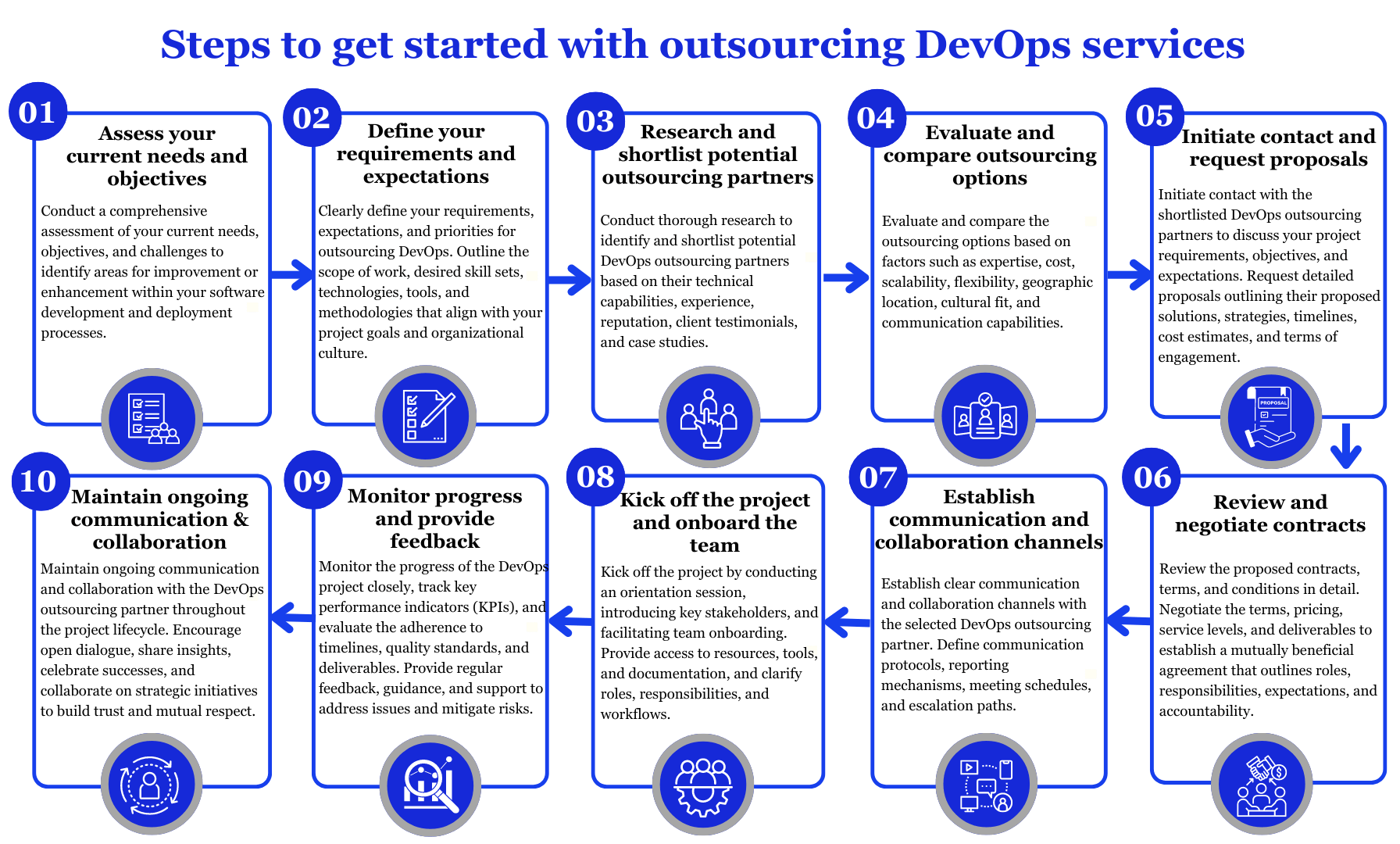Is your business struggling to enhance its software development and deployment processes? Do you need specialized DevOps expertise that your current team lacks? Are you concerned about the time and costs involved in building and managing an in-house DevOps team? Or perhaps, transitioning to DevOps practices while keeping your projects on track feels like a challenge?
If you can relate to these challenges, you’re in the right place. In this article, we’ll explore the benefits of outsourcing to DevOps companies and the essential factors for seamless integration and effective operations.
With extensive experience as an outsourced DevOps partner, we’ve witnessed both the successes and challenges businesses face when adopting DevOps. Drawing from our expertise, we’ll share key insights to help you make informed decisions when collaborating with an external DevOps team.
This article will help you determine if outsourcing DevOps is the right choice for your business and provide practical tips to ensure a successful and efficient DevOps implementation.
Benefits of outsourcing DevOps companies
Businesses are always looking for ways to improve software development and deployment. Outsourcing DevOps has become a strategic choice for many organizations. It offers several benefits that can improve performance and efficiency.
Below, we explain the main advantages of outsourcing DevOps. We also compare this approach with maintaining an in house DevOps team.
1. Cost savings
Outsourcing DevOps can help reduce costs. Businesses do not need to hire, train, or retain a full time in house team. This lowers long term staffing expenses.
Working with an external DevOps partner also provides access to specialized skills when needed. Organizations can use expert support without making ongoing investments in training or new tools. This makes outsourcing a cost efficient option for many businesses. According to a recent analysis by HireWithNear, outsourcing DevOps functions can reduce operational costs by up to 30%, primarily by minimizing overhead expenses and optimizing resource allocation.
2. Faster time-to-market
Speed matters in today’s competitive market. Outsourcing DevOps helps businesses accelerate software development and deployment.
With a dedicated team of experienced DevOps professionals, organizations can streamline processes and automate workflows. Tools such as Jenkins and GitLab CI CD support efficient automation. Teams can also implement continuous integration and continuous deployment practices more effectively.
Container technologies like Docker and Kubernetes further improve scalability and reliability. As a result, businesses achieve faster release cycles and reduce time to market for new products and features.
According to the Google Cloud DevOps Research and Assessment (DORA) report, elite-performing DevOps teams can deploy code 973 times more frequently and recover 6570 times faster than low-performing teams—making outsourcing a viable strategy for accelerated delivery.
3. Focus on core competencies
Outsourcing DevOps helps businesses focus on their core goals. Instead of managing complex DevOps tasks, teams can concentrate on innovation, product development, and customer engagement.
External experts handle automation and infrastructure using tools such as Ansible, Terraform, and Puppet. This reduces operational pressure on internal teams. As a result, businesses can stay competitive and support growth without being slowed down by technical complexities.
4. Enhanced security measures
Security is a top priority for businesses operating in the digital realm. Outsourcing DevOps companies often have dedicated security experts who specialize in implementing robust security measures and best practices. As highlighted by Wiz, this approach fosters a security-first mindset, ensuring vulnerabilities are addressed proactively rather than reactively.
Organizations can strengthen their cybersecurity by using cloud security tools such as AWS Security Services, Azure Security Center, and Google Cloud Security.
These tools help reduce risks and support compliance with industry standards and regulations. A proactive security approach protects sensitive data and supports business continuity. It also helps build customer trust.
5. Improved resource utilization
Efficient resource use is important for improving productivity and reducing waste. Outsourcing DevOps allows businesses to scale resources up or down based on project needs and demand changes. This flexibility helps control costs and improve overall efficiency.
Infrastructure as code tools such as CloudFormation and Terraform support better resource management. They allow teams to automate setup and allocate resources more accurately. This reduces operational overhead and improves return on investment.
External DevOps partners also use modern monitoring tools such as Prometheus, Grafana, and the ELK Stack. These tools improve visibility and performance tracking. As a result, organizations can strengthen collaboration, streamline workflows, and support continuous improvement across the development lifecycle.
How outsourcing DevOps works
1. Integration and collaboration
In modern software development, strong collaboration between development and operations teams is essential. This integration, known as DevOps, helps deliver high quality software on time and with fewer issues.
When DevOps is outsourced, effective collaboration becomes even more important. It influences how projects are planned, executed, and managed. Below are key ways outsourcing DevOps improves integration and teamwork.
Seamless integration with development teams
Outsourcing DevOps helps improve integration with development teams. External experts align DevOps practices with existing workflows and processes.
They use tools such as Jenkins, GitLab CI CD, and Docker to support continuous integration and continuous delivery. These tools help streamline code integration and automate testing. They also speed up release cycles.
By working closely with in house teams, external DevOps specialists improve collaboration. This leads to faster time to market, better code quality, and stronger overall software performance.
Collaboration model establishment
A strong collaboration model is key to a successful DevOps initiative. Outsourced DevOps teams often use proven methods such as Agile and Scrum. These frameworks help structure teamwork based on project goals.
Clear communication channels, defined roles, and shared responsibilities are established from the start. Teams also use collaboration tools such as Slack, Microsoft Teams, and Jira. These tools improve transparency and accountability.
This approach promotes cross functional teamwork and knowledge sharing. It also supports continuous improvement and better alignment between development, operations, and business teams.
2. DevOps practices implementation
Effective DevOps practices improve the speed, quality, and efficiency of software development and deployment. Outsourcing DevOps provides a structured way to implement these practices.
External teams bring specialized expertise and modern tools to achieve better results. Below, we explain how outsourcing supports key DevOps practices and how it compares to managing DevOps in house.
Automation of workflows
Outsourcing DevOps helps businesses automate complex and repetitive tasks. External DevOps teams have strong experience with tools such as Jenkins, Ansible, and Terraform.
Automation reduces manual errors and improves consistency. It also speeds up software updates and release cycles.
Compared to an in house setup, outsourcing allows faster implementation and easier scaling of automation processes. It also reduces the effort needed for ongoing maintenance. This allows internal teams to focus on core development work and improve overall efficiency.
Continuous Integration and Delivery (CI/CD)
Continuous Integration and Continuous Delivery help teams release software quickly and reliably. Outsourcing DevOps gives businesses access to experts in CI CD practices. These teams use tools such as GitLab CI CD, Jenkins, and Spinnaker.
External DevOps specialists set up strong CI CD pipelines. These pipelines support smooth code integration, automated testing, and continuous deployment to production. This approach reduces time to market and improves software quality. It also strengthens collaboration between development and operations teams. Moreover, as noted by Techradar, integrating DevOps and MLOps into a unified software supply chain further improves efficiency, collaboration, and deployment in enterprise applications.
Outsourcing DevOps for CI CD implementation gives businesses greater flexibility. Teams can adapt quickly to changing requirements and follow proven best practices.
External experts also help maintain high availability. This approach reduces the overhead linked to managing infrastructure in house.
Infrastructure optimization strategies
Optimizing infrastructure is important for scalability, performance, and cost control. Outsourcing DevOps gives businesses access to expert guidance for improving their cloud environments. External teams support platforms such as AWS, Azure, and Google Cloud.
DevOps partners use Infrastructure as Code tools like Terraform and CloudFormation. These tools automate and standardize infrastructure setup and management. This approach improves resource use, enhances application performance, and reduces costs.
Outsourcing infrastructure optimization also brings proven methods and faster deployment. Ongoing monitoring and maintenance improve system reliability. As a result, businesses achieve better efficiency and stronger application stability.
3. Support and Monitoring

Strong support and continuous monitoring are essential for successful DevOps implementation. They help maintain application reliability, performance, and security.
Outsourcing DevOps gives businesses access to specialized support and monitoring services. These services are designed to meet the needs of modern software environments.
Below, we explain how outsourcing DevOps improves support and monitoring compared to in house teams, and why this matters for software development.
24/7 support and monitoring services
Outsourcing DevOps provides round the clock support and monitoring. This helps ensure continuous system operation and fast issue resolution.
External DevOps teams use advanced monitoring tools such as Prometheus, Grafana, and the ELK Stack. These tools track infrastructure, application health, and performance metrics. Proactive monitoring helps detect issues early and supports quick response. It also allows continuous system improvement.
Compared to in house teams, outsourced DevOps offers access to specialized skills and extended support coverage. This reduces downtime and improves overall application performance and user experience.
Risk management and compliance measures
Risk management and compliance are essential in software development. They protect business continuity, data integrity, and regulatory alignment.
Outsourcing DevOps provides structured risk assessment and mitigation strategies. External teams design security measures that meet industry standards and regulations.
DevOps partners implement strong security controls and data protection practices. These include access management and monitoring systems. They also help ensure compliance with frameworks such as GDPR and HIPAA. Experienced providers stay updated on new risks and security threats.
This proactive approach reduces potential liabilities and simplifies regulatory compliance. It also builds trust with stakeholders and strengthens the reliability of software systems.
4. Continuous improvement
Continuous improvement is a core principle of DevOps. It supports innovation, improves performance, and drives long term growth in software development.
Outsourcing DevOps brings a structured approach to continuous improvement. External teams use specialized expertise and data driven insights to enhance delivery processes and results.
Below, we explain how outsourcing DevOps supports continuous improvement compared to in house teams, and why this matters for software development success.
Continuous improvement initiatives
Outsourcing DevOps supports a culture of continuous improvement. External teams focus on refining workflows, automating repetitive tasks, and improving infrastructure and application performance.
DevOps partners use proven methods such as Kaizen, Lean, and Six Sigma. These approaches help identify inefficiencies and bottlenecks in the development process. Teams conduct regular reviews and audits to improve performance and collaboration. This drives innovation and strengthens overall delivery quality.
Compared to in house efforts, outsourced DevOps provides objective insights and specialized skills. It also brings a structured approach to process improvement. This helps businesses achieve steady gains in productivity, quality, and customer satisfaction.
Performance metrics analysis and optimization
Performance monitoring is essential for identifying bottlenecks and improving efficiency. It helps optimize resource use and maintain application responsiveness.
Outsourcing DevOps gives businesses access to advanced monitoring tools such as Grafana, Prometheus, and New Relic. These tools collect and analyze performance metrics in real time. This provides clear visibility into system health and key performance indicators.
External DevOps teams use data driven methods to identify trends and detect anomalies. This allows early intervention and continuous performance tuning. As a result, businesses can resolve issues faster and improve overall system performance.
Compared to in house monitoring, outsourced DevOps offers stronger analytical capabilities and better scalability. It provides actionable insights that help maintain application performance and user experience across different environments and workloads.
5. Strategic guidance and partnership

Strategic guidance is an important benefit of outsourcing DevOps. It helps shape the direction and scalability of software development initiatives.
By outsourcing DevOps, businesses gain access to experienced advisors. These experts help align technology decisions with business goals. They also support long term planning and sustainable growth.
Outsourced DevOps encourages strong partnerships built on collaboration and shared objectives. Below, we explain how this strategic support compares to in house approaches and why it matters for software development success.
Strategic advisory services
Outsourcing DevOps provides access to strategic advisory services. These services help align technology plans with business goals and market needs.
DevOps partners include experienced architects and consultants. They use industry knowledge and technical expertise to design clear strategies and roadmaps. These plans guide execution and support long term success.
External teams also conduct technology assessments, risk reviews, and feasibility studies. This helps businesses gain practical insights and clear recommendations. As a result, organizations can address challenges and identify new opportunities.
Compared to in house planning, outsourced DevOps offers unbiased input and broader industry exposure. This supports better decision making, risk reduction, and faster adoption of modern technologies and best practices.
Long-term collaboration and partnership development
Building long term partnerships with DevOps outsourcing providers creates trust and transparency. It supports shared growth and encourages innovation and knowledge sharing.
Outsourcing DevOps promotes open communication between business and technology teams. This alignment helps create shared ownership and common goals.
Over time, external DevOps teams gain a deeper understanding of the business. They learn about operations, culture, and objectives. This allows them to deliver more personalized and value focused solutions.
Strong partnerships also help businesses benefit from the provider’s expertise and resources. This leads to smoother integration, consistent delivery, and sustainable growth in software projects.
Compared to in house efforts, outsourced partnerships offer greater flexibility and specialized skills. This helps businesses build resilient and long term collaborations that support innovation and competitiveness.
Steps to get started with outsourcing DevOps
As organizations look to improve their software development lifecycle, many choose to outsource DevOps. This approach provides access to specialized skills, faster delivery, and better operational efficiency. However, outsourcing DevOps requires a clear plan and strong collaboration to reduce risks and gain the full benefits.
The image below outlines the key steps involved in starting with DevOps outsourcing. It offers a structured view of the process and helps you make informed decisions that support project success and long term growth.

What are the key factors to consider while outsourcing DevOps companies?
By now, you have a comprehensive understanding of how outsourcing DevOps companies works, the benefits it offers, and how to get started. This knowledge positions you to make informed decisions, ensuring a seamless integration of DevOps practices into your business operations.
However, before you take the next step towards outsourcing DevOps, it’s crucial to consider several key factors. These factors not only guide you in choosing the right outsourcing partner but also play a vital role in the successful implementation and management of DevOps practices.
Understanding these essential aspects will help you optimize your budgets, ensure transparency, evaluate the scope of work, and set clear expectations that align with your business objectives. For a deeper dive into these crucial considerations, check out this article on 7 key factors to consider while outsourcing DevOps consulting services. This comprehensive guide will provide invaluable insights into the essential aspects to consider before making your outsourcing decision.
Still, trying to figure out how to proceed further with outsourcing DevOps companies? Feel free to reach out to our team at Mallow. We’re here to support you at every stage of the process.
Your queries, our answers
DevOps is a methodology that integrates development and operations teams to enhance collaboration and efficiency throughout the software development lifecycle. By promoting practices like continuous integration and continuous delivery (CI/CD), DevOps accelerates release times and improves software quality.
You should consider implementing DevOps when your projects are experiencing increasing complexity, frequent releases, quality and stability issues, or when there's a need for better cross-functional collaboration. DevOps is also ideal when you face scalability challenges or need to respond quickly to market demands.
For more details, get in touch with our team.
Security is a critical aspect of Mallow’s DevOps consulting services. We integrate security measures throughout the DevOps pipeline, using practices like automated security testing, continuous monitoring, and compliance checks. This ensures that your software remains secure without compromising speed or quality.
Automation is central to DevOps, enabling faster and more reliable software deployments. It involves automating repetitive tasks like code testing, integration, and deployment, which reduces errors, enhances efficiency, and allows your team to focus on innovation.
Key DevOps tools include version control systems, CI/CD pipelines, containerization platforms, and monitoring tools like Git, Jenkins, Docker, and Prometheus. Mallow provides comprehensive training and support to ensure your team is proficient in using these tools effectively.
A key practice of DevOps is Continuous Integration and Continuous Delivery (CI/CD). CI/CD involves the frequent integration of code changes into a shared repository and automating the deployment process. This practice helps in detecting issues early, improving software quality, and speeding up release cycles. By automating the testing and deployment phases, CI/CD ensures that software updates are delivered quickly and reliably.
Mallow offers ongoing support after the initial implementation of DevOps practices. This includes monitoring, troubleshooting, and continuous optimization to ensure your DevOps environment remains efficient, secure, and aligned with your business goals.
DevOps consulting services help streamline your software development processes, reduce time-to-market, and increase software reliability. By adopting DevOps practices, your organization can improve cross-functional collaboration, automate workflows, and enhance overall operational efficiency.
To learn how these practices can specifically benefit your application development, check out our insights on the value DevOps companies bring to the process.
Mallow’s DevOps consulting process involves assessing your current practices, identifying areas for improvement, and guiding your team through the adoption of DevOps methodologies. We offer tailored solutions, continuous support, and training to ensure successful DevOps implementation and long-term benefits.Check out how our DevOps consulting services can streamline your software development processes and improve efficiency
Yes, DevOps can be highly beneficial for small and medium-sized businesses. It helps streamline processes, improve software quality, and reduce time-to-market, giving smaller organizations a competitive edge. Mallow tailors its DevOps consulting services to meet the specific needs of businesses of all sizes.
Mallow stands out for its expertise, collaborative approach, and commitment to continuous improvement. With over 5 years of dedicated experience in DevOps, our team provides customized solutions that drive efficiency, innovation, and reliability in your software development processes.
To know more, get in touch with our experts.
Yes, Mallow provides migration services to help transition your existing projects to a DevOps environment. We assess your current setup, plan the migration strategy, and ensure a smooth transition with minimal disruption to your operations.
The main purpose of DevOps is to bridge the gap between development and operations teams to enhance collaboration and streamline the software development lifecycle. By integrating processes and automating workflows, DevOps aims to accelerate the delivery of software, improve quality, and increase operational efficiency. This approach supports continuous development and deployment, leading to faster innovation and more reliable software solutions.
Mallow prioritizes continuous improvement by monitoring key performance metrics, gathering client feedback, and iteratively optimizing strategies. We also promote a culture of experimentation and learning, ensuring your DevOps practices evolve and improve over time.
Author
Manivel
Manivel is the Chief Technology Officer (CTO) at Mallow Technologies, with over two decade of experience in the field of application development. His driving vision when co-founding Mallow was to empower businesses to unlock their potential through the strategic utilisation of technology. Over the years, he has solidified his reputation as a reliable technical partner and advisor to clients spanning various sectors. Manivel's unique proficiency in ideating and delivering customised application solutions has played a transformative role in facilitating the success of numerous enterprises amidst the ever-evolving digital landscape.




